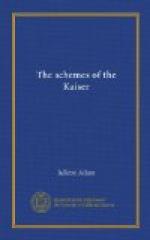William’s idea was to repeat the exploit performed by the troops of Charles XII (with the aid of the Russian Viborg Regiment, of which he is Colonel) and to pass through the heavy mass of a regiment of cavalry with light infantry battalions. The future Commander-in-Chief of the German Army wished to show the world that he would know how to add the elan of the French and the impetuosity of the Slav to the qualities of method and strength perfected by leaders like Von Moltke or Frederick Charles. Therefore, several weeks before, William II had asked the Tzar to be allowed to take part in the manoeuvres and to command in person the Viborg Regiment.
And so it came to pass that, having cast himself for a part of invincible audacity, he came to cut a very sorry and ridiculous figure. Surrounded by the Hussars, he was made to see that what may be done with German infantry against Uhlans, cannot be accomplished, even with Russian soldiers, against Russian cavalry.
This incident shows that the Tzar had something akin to second sight when he gave orders that the length of the manoeuvres would be optional. Thanks to this, the Kaiser was free to take home the sooner his pretty jacket (no, his tunic, I mean) from Narva.
What an interesting broadsheet might be made on the subject of “William II a prisoner”!
In the long winter evenings to come, how many a Russian peasant—gifted with imagination as they are—in telling again the tale of the Viborg Regiment’s attack, will see in it an omen of the destiny of the German Emperor! And they will add, with bated breath, that the Hohenzollern, on leaving the shores of Russia narrowly missed being cut in two by another vessel. And one more sign of evil omen—a fearful tempest shook the Imperial yacht in Russian waters.
Let us, whose Emperor was a prisoner of the Germans in 1871, pray that some day a German Emperor may be taken prisoner by the Russian army—not like at Narva, but in all seriousness.
I said in my last letter that it might well be that William’s journey to Russia might result in stiffening the resolution of the Emperor Alexander. And so it has proved, for scarcely had his Imperial guest returned to Berlin, than a ukase raised the Russian Customs tariff and imposed a new duty of 20 per cent. on German imports. A fine result this, of that which the German Press, before William’s departure, described as the Russo-German Economic Entente, at a moment when, even for the Berlin newspapers, the prospects of a political entente were somewhat dubious.
For this reason, Professor Delbrueck says quite bluntly, in the “Prussian Annals,” that William II’s journey to Russia has been a lamentable fiasco; that the Tzar declined to listen to any diplomatic conversation; that he ridiculed and entertained his Imperial guest with a series of military parades whilst the Russian general staff was carrying out important manoeuvres on the western frontiers.




